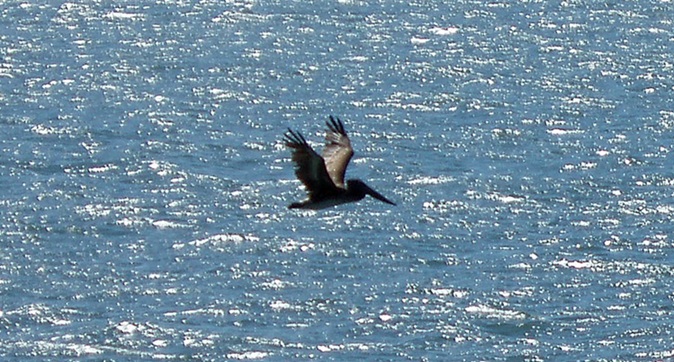Dinner Served
The sun breaks through the coastal fog,
Replacing damp-chill hidden mysteries
With warm-wrapped scented dialogue
Between the sand-surf and an offshore breeze.
From shoreline poles the eagles stare
To watch a squawking beach-blown seagull flap
Its upraised wings in proffered prayer
In hopes of pecking up a wave-washed scrap.
Where azured sky meets sea-steeled blue
A soaring pelican abruptly stalls
With awkward, long-broad wings askew,
And with a fated fish in view, it falls.
A crashing splash as ocean spray,
Like crystal lava from a fissured cone,
Erupts, obscures, and blurs both prey
And predator. The drama’s end unknown,
Till phoenix-like, emerging, surging,
Wing-beat flailing, near-to-failing, rise!
Now airborne. Life and death converging.
Dinner served. An appetizing prize.
James A. Tweedie is a retired pastor living in Long Beach, Washington. He has written and published six novels, one collection of short stories, and four collections of poetry including Sidekicks, Mostly Sonnets, and Laughing Matters, all with Dunecrest Press. His poems have been published nationally and internationally in both print and online media. He was honored with being chosen as the winner of the 2021 SCP International Poetry Competition.















An alliterative treat. I loved the ironic, yet fully valid comparison with the phoenix when the pelican emerges with his din-dins.
Thanks for the read, James.
James, I appreciate your poem’s beautiful ocean imagery and artistic interplay between the natural and physical worlds … very nicely done!
The intertwining of tetrameter and pentameter lines is effective and smoothly done. Also, there is a deft use of past participle forms, which I think is deliberate. There’s “warm-wrapped scented,” “beach-blown,” “proffered,” “wave-washed,” and “fissured.” I believe they are deliberate because of the third quatrain. There we read
Where azured sky meets sea-steeled blue…
Since the poet has a past participle in the compound “sea-steeled,” he deliberately parallels it by changing the normally expected “azure” to the very unusual form “azured,” another past participle form. This is one of those small touches that show very careful attention in poetic composition.
James, your excellent poem contains a hint of religious significance for me. Rising like the phoenix from what seemed like the clutches of death alludes to salvation and a regenerative life. The several inspired hyphenated alliterative words were a special treat to my senses as was the entire poem.
This is a marvellous treat indeed. I was mesmerised by your phrases: beach-blown, sea-steeled, long-broad… Thank you. Dinner was served dramatically
I left a comment earlier, but it seems to have vanished… fortunately I saved it– here is is again:
Jim, I love your use of kennings in this poem: eight in 20 lines (nine if you count “near-to-failing”)! I think the juxtaposition of opposing (or even sometimes complimentary) terms really stretches the imagination– I can feel the “damp-chill” while smelling the “warm-wrapped” scented “sand-surf” meeting the ocean breeze… I envision the seagull being “beach-blown” while searching for his “wave-washed” scrap… I can see the color “sea-steeled” blue and the pelican’s “long-broad” wings, his “wing-beats” as he, “near-to-failing”, rises “phoenix-like.” Such a useful technique, and you have used it to produce beautiful and effective results! Your poem makes me realize how much I truly miss the ocean! Well done!